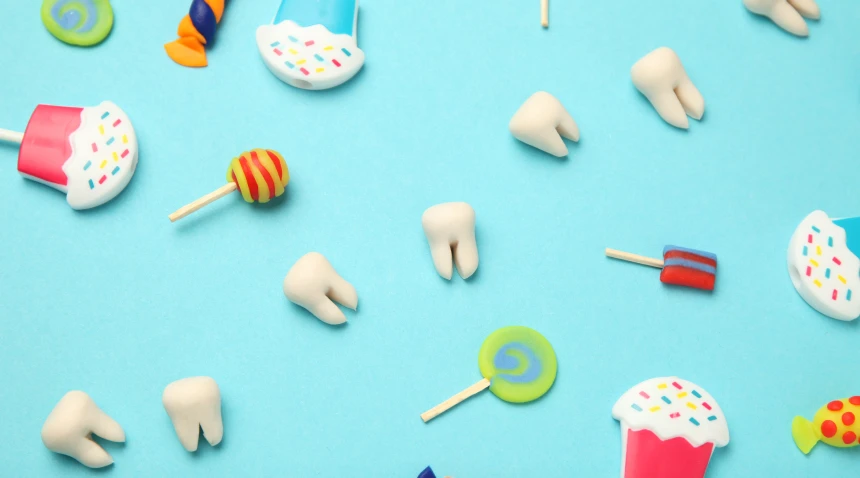A balanced diet helps maintain good oral health. Teeth and gums need a regular supply of nutrients to stay strong. Fruits, vegetables, whole grains, quality proteins, and dairy products provide essential vitamins and minerals. Calcium, phosphorus, and vitamin D are indispensable for strengthening enamel.
Eating habits also influence the balance of the oral microbiota. Simple sugars and sticky foods promote bacteria responsible for dental plaque and cavities. Adapting one’s diet therefore helps preserve overall health and prevent dental problems.
Sugars and their impact
Many foods contain sugar, sometimes unexpectedly. Sweetened drinks, pastries, candies, as well as processed foods or industrial sauces, often contain hidden sugars.
When sugar remains in prolonged contact with the teeth, bacteria in dental plaque use it as an energy source, and convert it into acids. These acids gradually attack the enamel, weaken the tooth, and promote the development of cavities.
Reducing free sugar intake helps limit these risks. It is also important to decrease the frequency of sugar consumption throughout the day. Snacking on sweets between meals exposes teeth to repeated acid attacks.

Eating sweet foods right after a meal, and brushing your teeth afterward, reduces the risk. Drinking water after dessert also helps neutralize acidity.
Tooth-friendly foods
Certain foods strengthen the teeth and reduce acid attacks. Milk, cheese, and plain yogurt provide calcium and phosphorus. They also stimulate saliva production, which is essential for protection against cavities. Crunchy fruits and vegetables, such as apples, carrots, and celery, mechanically clean the teeth and promote salivation.
Nuts, seeds, and oily fish, which are rich in essential fatty acids, contribute to gum health. A fiber-rich diet helps regulate blood sugar levels and reduces sugar cravings, thereby limiting repeated exposure to carbohydrates.
Beverages and their influence

Water remains the healthiest drink to stay hydrated and protect the teeth. Conversely, sodas, commercial juices, and many sweetened beverages combine sugar and acidity—a particularly harmful duo for enamel.
Even without sugar, some acidic drinks such as “light” sodas, energy drinks, or certain flavored waters can, over time, weaken and erode enamel. Regular consumption increases the risk of dental erosion, sensitivity, and cavities.
Coffee, tea, and red wine can stain enamel. It is better to drink them in one sitting rather than sip them throughout the day. Rinsing the mouth with water afterward helps limit staining.
Diet and dental erosion
Dental erosion results from repeated acid attacks. In addition to sugar, certain acidic foods such as citrus fruits, tomatoes, or vinegar can weaken enamel. These should not be completely avoided, as they provide important nutrients, but consuming them during meals helps reduce their impact. After eating acidic foods, waiting before brushing your teeth helps protect softened enamel.
Including alkaline foods such as green vegetables helps neutralize acidity and protect the teeth.
Adapting your diet after dental treatment
After an extraction or crown placement, it is best to eat soft, lukewarm, and easy-to-chew foods. Soups, applesauce, purées, and yogurt help prevent irritation. Following your dentist’s recommendations facilitates a gradual return to a normal diet.
In cases of dental sensitivity, limiting very hot, very cold, or acidic foods reduces discomfort. Proper hydration and adequate nutrient intake promote healing and oral health.

Preventing cavities through diet
Limiting sugar, favoring complete meals over snacking, and choosing foods that stimulate saliva all help prevent cavities. Combining these habits with twice-daily brushing using fluoride toothpaste and regular dental visits provides stronger protection.
Children should learn these habits early, as permanent teeth do not regenerate. Nutritional education therefore plays a major role in preserving their smile.
Personalized guidance at Mirabeau Dental Clinic in Paris 16
Each person has unique habits and specific needs. Some may be more prone to cavities or gum disease due to diet, health condition, or certain treatments. Personalized advice helps easily adjust eating habits.
During a consultation, the dentist assesses lifestyle, medical history, and dietary preferences to provide tailored recommendations.
At Cabinet Mirabeau in Paris 16, the focus is on prevention and personalized support to help each patient maintain a healthy smile through balanced nutritional choices.
You may also like: After teeth whitening